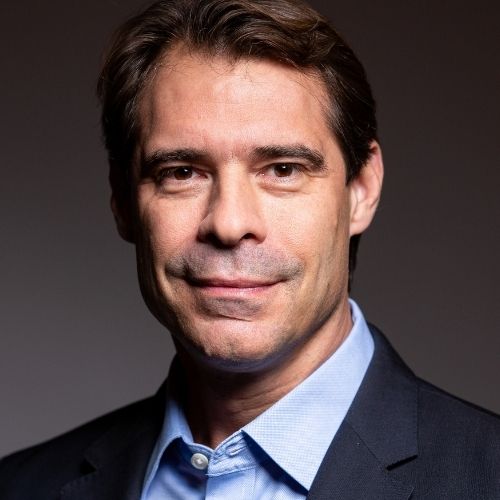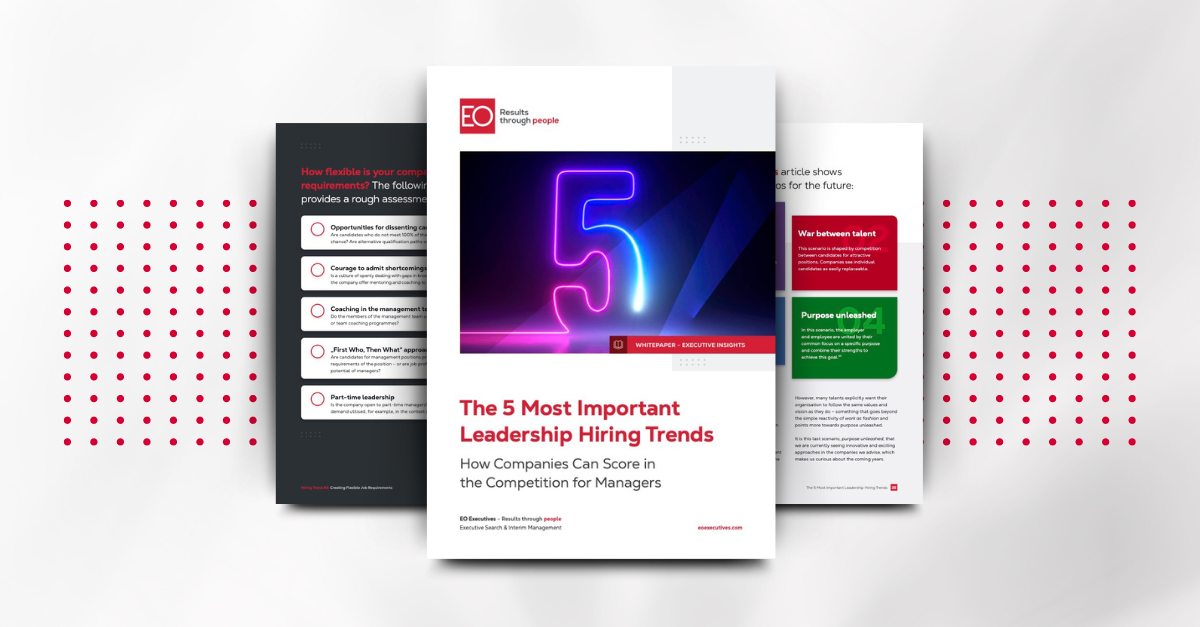The 5 Most Important Leadership Hiring Trends: How Companies Can Score in the Competition for Managers
Written by Christian Hener & Oliver J. Peters on March 4, 2024

When it comes to filling management positions, companies face a decisive challenge, as good leaders today often can choose between various options.
However, this is only one side of the coin: it is just as important for candidates to carefully check whether the company fulfils the criteria that are important to them personally. As appointments to management positions make a significant contribution to a company's success, it is of central importance for companies to develop effective strategies to score points in the competition for the best candidates.
![]()

»Today, whatever a candidate thinks about a company has less to do with financial incentives - rather, they are looking for a holistically attractive working environment that meets their expectations.«
Oliver J. Peters
![]()
Identifying candidates' expectations before the recruitment process begins and responding to them appropriately is a challenging task. This is especially true in the area of executive recruitment, since companies can reach the pinnacle of success only with the best leadership team.
The EO whitepaper "The 5 Most Important Leadership Hiring Trends: How Companies Can Score in the Competition for Managers" offers valuable help in effectively filling management positions critical for success by providing well-founded insights and offering concrete suggestions on how companies can take the lead.
![]()
Whitepaper: The 5 Most Important Leadership Hiring Trends

The whitepaper can be download free by all interested parties:
What Managers Expect: The 5 Most Important Trends for Attracting the Best Leaders
Attracting excellent managers requires a keen sense of their expectations. Companies and managers are in a constant interplay: companies try to fulfil candidates' expectations and thus form industry standards. Candidates, in turn, base their expectations on these standards as well as their experiences with previous employers.
This interplay is described by the terms Talent Trends (expectations from the candidates' perspective) and Hiring Trends (actions from the company's perspective). Which five Talent Trends characterise candidates' expectations the most today – and which Hiring Trends are derived from them? Below, we have summarised the most important trends we see in our contact with clients and candidates from a wide range of industries and countries.
Trend #1 - Daring More Plurality During the Appointment Process
In the digital age, companies need to rethink the recruitment process to do justice to the ever-changing conditions. This is the only way to reach the right candidates in the first place. This starts with the channels that are activated for the search for a new position, but it encompasses several facets, as described below.
Using Different Channels for the Search
In many cases, the focal point of the executive search has simply shifted from traditional job adverts to LinkedIn. Other important channels and options often remain unused: activating your own network, databases, job portals, directly approaching top executives working for competitors, obtaining recommendations from industry colleagues, ... Companies that can break through these barriers can increase their potential candidate pool, and consequently, their chances of success.
Think and Search Globally
Searching across regional and national borders has a similar effect. Thanks to digitisation, geographical distance is often no longer a criterion for exclusion. Companies need to break new ground and develop strategies for nationwide or even international recruitment. In this way, more talented candidates can be included in the search, and at the same time, diversity is boosted.
Diversity, Equity & Inclusion
The topic of Diversity, Equity & Inclusion aims to promote plurality, minimise differences in opportunities and create an inclusive working environment. This topic is of great importance for today's 28-to-42-year-old generation Y managers. Companies that make a serious effort to generally increase diversity have the upper hand when it comes to management appointments, and are also more successful economically, more competitive and achieve better results.
Trend #2 - Remote Work
Digital tools have made working together remotely easier in recent years, as well as ensuring better work-life-integration and enabling more diversity in companies. Managers are among those benefiting from this change.
Nevertheless, remote management remains a challenge that demands special skills from managers. Remote managers require a particular skill set compared to on-site managers. This includes optimal (self-)organisation, special skills in dealing with people and creating a sense of belonging.
![]()

»Companies need to make their culture and the skills of their managers fit for the new requirement of remote work if they aim to make remote models successful in the long term.«
Christian Hener
![]()
Trend #3 - Human Touch
As a result of digitisation, there are fewer and fewer interactions that take place directly between people, face to face. This can quickly come across as cold and sterile. That is why it is crucial to do justice to candidates from the beginning of the recruitment process, not only on a content level, but also by consciously recognising them as beings with personal and social needs. This includes valuing human skills, promoting interpersonal contact and ensuring individual quality of life, for example through flexible working models.
Managers have a dual role in this context: on the one hand, they are social beings themselves and expect the company to fulfil their human needs. On the other hand, they are representatives of the company to their employees and must ensure the necessary "Human Touch" – a complex task, in which the company management must support them.
Trend #4 - Pursuing a Clear Vision
Young managers, in particular, are looking for employers whose vision resonates with their personal ideals. Companies must, therefore, define a convincing line and a common goal to attract and retain managers in the long term. This increases the attractiveness for applicants and leads to better economic results thanks to a clearer positioning that is worth fighting for.
The fight against the environmental and climate crisis is a vision with particular topicality and a strong unifying moment. Companies that are honestly (!) committed to the environment, currently have the best chance of convincing committed managers, especially the next generation of leaders.
Trend #5 - Creating Flexible Job Requirements
Today, managers often have to figuratively move mountains. It is becoming increasingly difficult to find managers with all the hard and soft skills required for a complex role. Companies need to become more flexible in their requirements for managers, as the 100% perfect candidate can only be found in rare cases.
One possible solution to this problem is to outsource management tasks to external service providers, particularly in the context of interim management. Another option is to divide complex management positions into different job packages and assign these flexibly to the managers with the most suitable qualifications. Mentoring and coaching play an increasingly important role in this.
Conclusion: Where Is the Trend Heading?
The future of the recruitment process is characterised by a new era in the relationship between companies and candidates. Companies must take this into account, especially when searching for top executives.
The Deloitte Insights article "The worker-employer relationship disrupted" shows new ways in which the interplay between Talent Trends and Hiring Trends could develop. One of these scenarios, Work as fashion, visualises a future in which companies – similar to the fashion industry – react mechanically to trends. However, this scenario is anything but ideal.
Instead of lagging behind, companies must always be one step ahead of managers' expectations. This is particularly successful when managers and companies work together towards a common goal (Purpose Unleashed scenario). The consultants at EO Executives can provide support in this endeavour through passion and expertise, both in executive search as well as in an advisory capacity.
You can find more information on how to convince candidates in the EO whitepaper "The 5 Most Important Leadership Hiring Trends: How Companies Can Score in the Competition for Managers". Our many years of experience will help you attract those managers who will put you on the road to success.
The way to the best leadership team you have ever had is not to react to trends. To make yourself more attractive as an employer than your competition, you need to actively and consciously shape your own corporate culture, an effort that is also decisive for achieving your economic goals. This is the only way to realise the fascinating future that Deloitte Insights paints in the Purpose Unleashed scenario. Read more about this in our whitepaper:
![]()
Whitepaper: The 5 Most Important Leadership Hiring Trends

The whitepaper can be download free by all interested parties:
The Authors
About EO Executives
Success in companies is made by people
Success in companies is made by people ("Results through people"). Executives play a particularly important role in this. Our mission is to help our clients build the best leadership team they have ever had.
To do this, we bring together our clients with consultants who are highly individual and have specific knowledge. Our consultants are experts in their respective industries and functional areas. Because our consultants have such a high level of expertise, we ensure that success-critical leadership positions are filled quickly, permanently and successfully.
Successful leadership teams through executive-intro®
In addition to competent consultants, our team consists of dedicated researchers and staff – and each brings their extensive knowledge to the search for the perfect executive. Our unique methodical approach, executive-intro®, ensures that our candidates are not only convincing from a professional point of view, but also represent a long-term enrichment for the management team and the company on an interpersonal level.
We call this a ”Perfect Match“.
EO Executives was founded in 1997 and is now present in six countries worldwide with a total of 33 locations. We fill positions with both permanent executives and experts as well as quickly available interim managers for temporary assignments and projects. In addition, we support our clients with further consulting services in the areas of executive search, interim management and leadership development.

